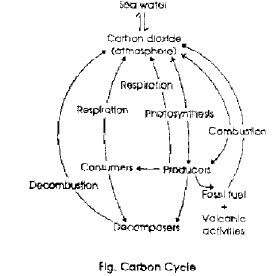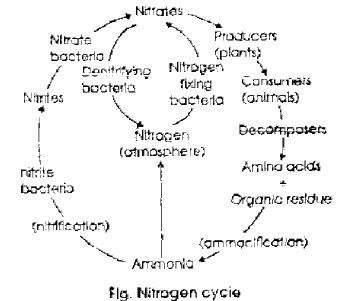In the universe only in our planet earth life exists. Earth has three components:

The life supporting zone of earth where atmosphere, hydrosphere and lithosphere meet, interact and make life possible is called biosphere. A constant interaction between non-living (abiotic) and living (biotic) components of the biosphere results in teh transer of food and energy, which makes the biosphere a dynamic but stable system.
Biosphere includes all of the earth’s living organism interacting with the physical environment in a manner that helps to maintain a steady state of equilibrium of energy flow. However, each organism has its own dwelling place, called habitat. Thus, for a fish living in fresh water pond, the pond it its habitat.
Abiotic components : The different mineral salts such as calcium, potassium, magnesium, gases such as oxygen, nitrogen, carbon dioxide, water and soil form the obiotic factors of ecosystem. Besides these organic compounds such as protein, carbohydrates lipid, humic subtances etc. also form the aboitic components. The producers (green plants) utilize these substances from soil and air in order to prepare the food which is ultimately transferred to different consumers.
The two processes such as energy movement (Energy flow) and nutrient movement (Biogeochemical cycle), are the important functions of an ecosystem.
Energy flow : The movement of energy in the ecosystem is in a single direction and non-cyclic. There is a continuous transfer of energy from one trophic level to the next trophic level in the food chain. At each leve, energy is used by the organism for metabolic activities and for growth and some amount is released (utilized energy) as heat to the environmnt which cannot be reused by plants. Therefore the amount of energy available at each successive trophic level is less than the energy at the previous level. As per Ten percent law, only ten percent of the energy entering a particular trophic level is stored and the remaining is lost during transfer.

Biogeochemial cycles : In a food chain it is noticed that some energy is lost at every trophic level but there is no loss in the nutrient component. Only when th eorganisms die and decay, teh nutrients are released to the environment due to the action of decomposers, thus the nutrients are available for reuse and for recycling. The cyclic flow of nutrients between non-living environment (soil, air, water) and living organisms is called biogeochemical cycles. The circulation of essential chemical nutrients like Carbon, Oxygen, Nitrogen, Sulphur, Water etc., in a biosphere is called biogeochemical cycles. Carbon cycle : All organic compounds that enter into the composition of living matter contain carbon. The three
main sources of carbon are (a) CO2 of the air and CO2 dissolved in oceans. (b) Carbonate rock in teh earths’ crust and (c) Fossil fuels like coal and petroleum. Being a major elements involved in the fixation of energy by photosynthesis, it is closely tied to energy flow and the two are inseparable.
The basic movement of carbon is from atmosphere reservoir (0.032% concentratoin) to producer, through photosynthesis. Inside the biosphere, the movement of carbon is through the food chains from teh producers to the consumers and from these groups to decomposers. Carbon is returned to the surroundign medium as carbon dioxide. cycling of CO2 occur in the following ways (a) by respiration in plants and animals and (b) by decay and decomposition by decomposers and also by (c) the burning of wood and fossil fuels.

4.2 Nitrogen Cycle : Nitrogen is an essential component of all protein and nucleic acides which form the structural framework of the living organisms. Though atmosphere contains aobut 78% of nitrogen, if cannot be utilized by living organisms unless it is converted to ammonia, amino acids or nitrates. These compounds which are available in teh soil is cycle and recycled through the ecosystem.
Nitrogen cycle involves, nitrogen fixatin, nitrogen assimilation, ammonification, nitrification and denitrification.
During nitrogen fixation, nitrogen is oxidized to oxides by lightening and thse oxides get dissolved in rain water and get precipitated. During biological nitrogen fixation, the nitrogen fixing bacteria and blue green algae convert gaseous nitrogen to ammonia and nitrates.
Nitrogen assimilatin : Nitrates are reduced to form amino acids within the plants and are ultimately converted to proteints. Animals get their supply of nitrogen in teh form of plant or animal protein thrugh food chain.
Ammonification : Proteins of animals are exerted out in the form of urea, uric acid of ammonia and als when the plants and animals die, their proteins are broken to release ammonia by the action of bacteria and certain fungi.
Nitrification : During this process, the ammonia is convered to nitrites and nitrates by soil bacteria such as Nitrobacter and Nitrosomonas which are then absorbed by plants though their roots.
Denitrification : Free living soil bacteria such as Pseudomonas reduce nitrate ions of soil into gaseous nitrogen which returns to the atmosphere.

Micro-organisms involved in N cycle are
Oxygen cycle : The atmosphere contains about 21% of oxygen. It is found dissolved in water. It is also found as a constituent of water (H2O) carbon dioxide (CO2) and other organic and inorganic compounds.Oxygen is very essential for all living beings for their respiration. It is also used for burning o fuels suchas coal, wood etc.

